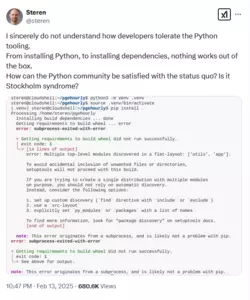Google employees too stupid to even properly package a python application or follow detailed instructions on how to fix it
 (why does archive.is use light mode??)
(why does archive.is use light mode??)
https://x.com/steren/status/1890170930980094382
 (why does archive.is use light mode??)
(why does archive.is use light mode??)https://x.com/steren/status/1890170930980094382

